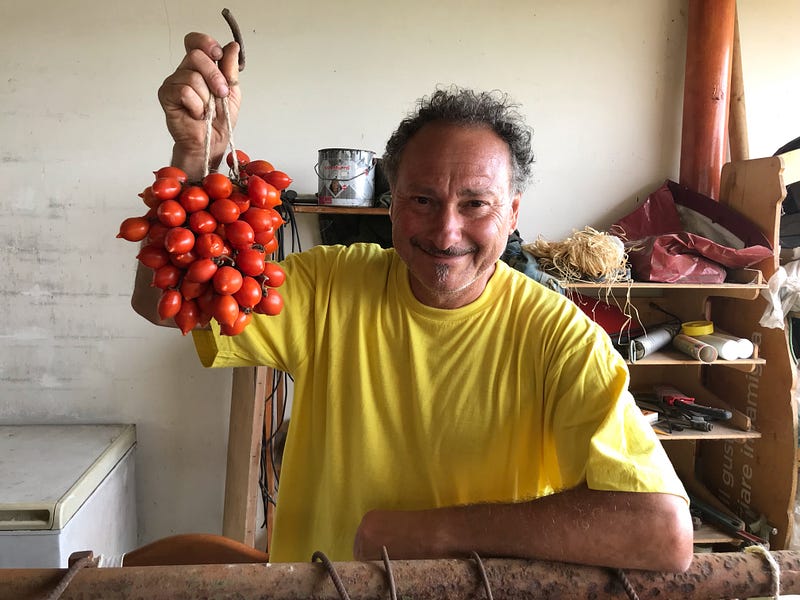A Hidden Gem of Southern Italy: The Piennolo Tomato
Written on
Chapter 1: The Enigmatic Piennolo Tomato
Nestled in the Italian region of Campania, the imposing Mount Vesuvius silently oversees its prized tomatoes. While the famous San Marzano variety dominates the landscape, a few select plots are dedicated to a lesser-known but equally fascinating variety: the piennolo. This thumb-sized, pointy-tipped tomato is cultivated by Pasquale Imperato.
Pasquale describes its flavor as “Amorevolmente Amarognolo,” which translates to “A Lovely Bitterness.” This rich, tomato-like essence is influenced by the volcanic soil and climate surrounding Vesuvius.
Pasquale, who bears a striking resemblance to actor Harvey Keitel, initially ventured into the world, encouraged by his father to pursue a path that felt more like a passion than labor. However, he eventually returned to Campania, discovering that his true calling lay in farming. He initially experimented with apricot cultivation but soon recognized that apricots were a global commodity. What truly distinguished his region was the unique piennolo tomato.
The piennolo variety is not only special but also resilient, thriving in harsh conditions to provide a distinctive experience for those who seek it out. These tomatoes are characterized by their thumb-length shape, ending in a pointed peduncle. Their thick skin enables them to endure arid climates, while the peduncle, which Pasquale refers to humorously as a “nipple,” has adapted to channel morning dew directly to the plant's roots, optimizing moisture absorption from the air. The sulfur-laden winds from Vesuvius contribute to the tomato's unique flavor, further enhancing its “Lovely Bitterness.”
Despite operating on just a single hectare of land, Pasquale manages to cultivate an impressive 15,000 plants, each yielding around 5 kilograms of fruit. Remarkably, he accomplishes this without any synthetic fertilizers, relying solely on compost and minimal irrigation. Sophisticated hydrometers connected to his iPhone allow him to monitor soil moisture, ensuring that irrigation occurs only when absolutely necessary. Additionally, he employs a beneficial root fungus in his irrigation system to combat downy mildew.
Pasquale maintains that adhering strictly to organic standards can be limiting. Instead, he employs an integrated farming approach that allows for the careful use of chemicals when necessary. His 2000 DOP certification provides a legal framework that helps maintain the market value of his tomatoes, unlike the apricots lower down the slope, which face stiff competition from imports.
When it comes to preparing these exquisite tomatoes, Pasquale recommends cooking them whole in olive oil. He insists that cutting them will ruin the dish. After simmering for a minute, he suggests gently pressing them and adding a splash of water from the boiling pasta. Once the pasta's “pores have opened,” it's time to mix it with the piennolo.
Finding Campania-grown Piennolo tomatoes in the United States can be challenging. However, a reliable source is Gustiamo, an Italian specialty food importer. While these tomatoes are often found preserved in jars, for those seeking them fresh and sun-dried on the vine, a trip to visit Pasquale might be the only option.
Explore the exquisite Grande Sendrée by Drappier Champagne in this Prestige Wine Review video, showcasing the artistry of wine-making.
Section 1.1: The Cultivation Techniques
Pasquale's innovative methods ensure that the piennolo tomatoes are cultivated to perfection, emphasizing sustainability and flavor.
Subsection 1.1.1: The Importance of Soil and Climate

Section 1.2: Culinary Uses of Piennolo Tomatoes
Discover how to cook with these unique tomatoes for an authentic Italian experience.
Chapter 2: Finding Piennolo Tomatoes in the US
Locating these rare tomatoes outside of Italy can be a challenge, but specialty importers like Gustiamo provide a dependable option.